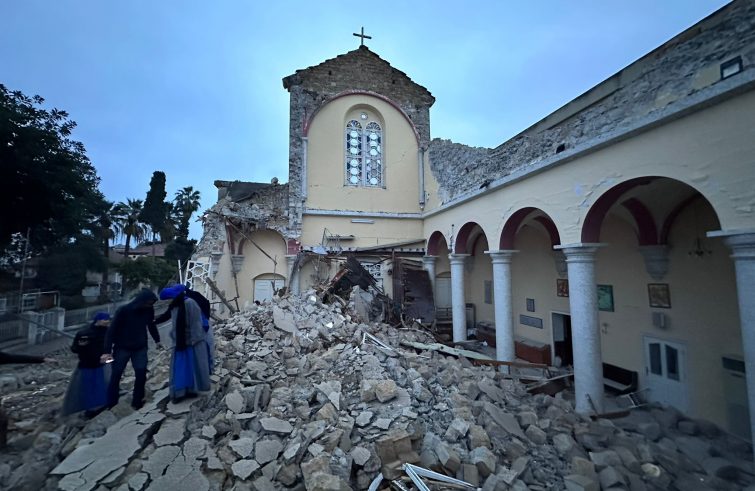
“We will be needing your constant presence also in the coming months, because this emergency is bound to continue for a long time. The state of emergency and precariousness will be over in a year or maybe two. What worries me is when media attention shifts elsewhere, because we need your unwavering support, everything here has been reduced to rubble, thousands of buildings have been damaged, road and other infrastructures were destroyed by the quake, people have been left homeless. Over 3,000 children in
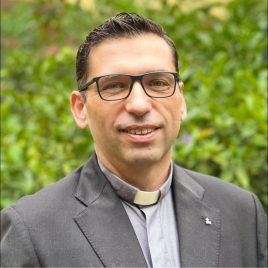
Turkey were orphaned. I cannot imagine how we will resume normal life. We will manage only with the help of God and the help of all people.” Father Antuan Ilgit, Vicar General of the Apostolic Vicariate of Anatolia, is speaking from Iskenderun, one of the most severely earthquake-hit cities in Turkey. “We have electricity at the moment – he says to SIR – and thus all wireless communications are in place. But we have no gas and no running water.” He then goes on to add:
“There is one good thing that the earthquake has shown us: a positive cooperation between countries has emerged from this tragedy. That is the way forward. World powers should embrace peace and cooperation rather than war and division. If we succeed in this, we can make it. This tragedy has shown that it can be done.”
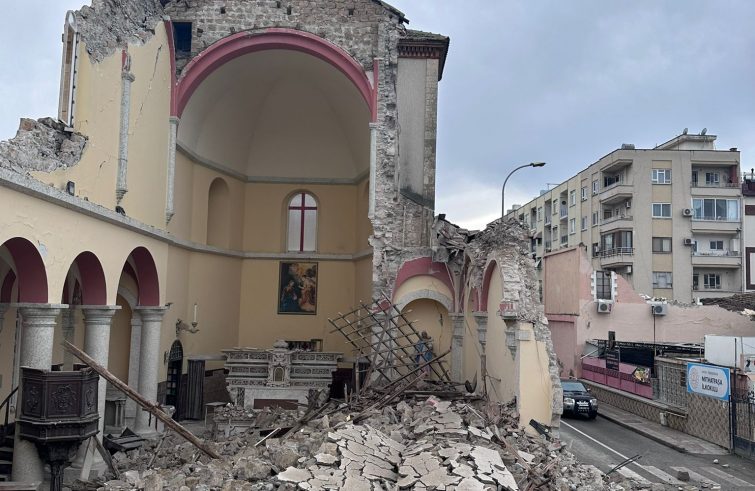 Fr Antuan describes the first minutes after the first tremors on February 6 in Iskenderun. “I rushed out of my room immediately after the quake and we went to check the cathedral, which had crumbled down entirely. The first thing I did was to save the Blessed Sacrament, because the apse was still standing. As we started to realise what had happened, I saw our parishioners arrive in tears. ‘We lost our homes,’ they said. I assumed they were referring to their own home, but they were actually referring to the cathedral that is the seat of the Apostolic Vicariate of Anatolia, the only Roman Catholic church in this city, thus an important centre for the life and history of this Christian community. We offered shelter to residents straight away.” There are no distinctions: there are parishioners, as well as Syriacs, Orthodox and some Muslim families. While the cathedral was a heap of rubble, the bishop’s residence was accessible. The refectory has a wooden roof, and it became a shelter for over one hundred people left without a home. Here people sleep, eat, celebrate Holy Mass. “It has become our cathedral, the place where our daily life takes place,” says Father Antuan.
Fr Antuan describes the first minutes after the first tremors on February 6 in Iskenderun. “I rushed out of my room immediately after the quake and we went to check the cathedral, which had crumbled down entirely. The first thing I did was to save the Blessed Sacrament, because the apse was still standing. As we started to realise what had happened, I saw our parishioners arrive in tears. ‘We lost our homes,’ they said. I assumed they were referring to their own home, but they were actually referring to the cathedral that is the seat of the Apostolic Vicariate of Anatolia, the only Roman Catholic church in this city, thus an important centre for the life and history of this Christian community. We offered shelter to residents straight away.” There are no distinctions: there are parishioners, as well as Syriacs, Orthodox and some Muslim families. While the cathedral was a heap of rubble, the bishop’s residence was accessible. The refectory has a wooden roof, and it became a shelter for over one hundred people left without a home. Here people sleep, eat, celebrate Holy Mass. “It has become our cathedral, the place where our daily life takes place,” says Father Antuan.
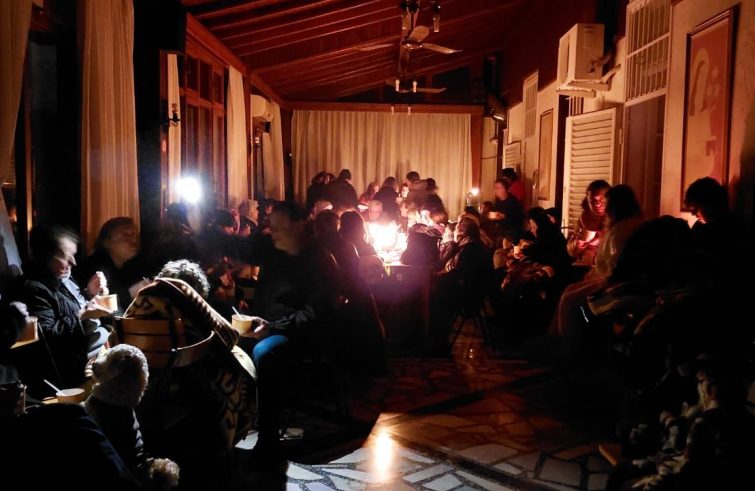 “During the first two days – recounts the priest – we shared everything we had in our pantries and refrigerators, but we started to run out of supplies and faced the risk of running out of food, and especially of drinking water. We fortunately started receiving supplies thanks to the efforts and support of our bishop who happened to be in Italy, Monsignor Paolo Bizzeti.” Food, water and blankets first arrived through the Spanish Navy. “We used those aids both for the people who were sheltering with us and for the people outside.” Caritas Anatolia, which had been working for the poor and refugees even before the earthquake, took immediate action and is now successfully providing food for the people housed in the refectory, it is also distributing 1,000 meals a day to people outside the premises. “We are working as a team with our bishop and Father John Farhad Sadredin, director of Caritas Anatolia. We are receiving plenty of help and we thank everyone for this. It gives me great hope. The image of the living stones accompanies me since day one.
“During the first two days – recounts the priest – we shared everything we had in our pantries and refrigerators, but we started to run out of supplies and faced the risk of running out of food, and especially of drinking water. We fortunately started receiving supplies thanks to the efforts and support of our bishop who happened to be in Italy, Monsignor Paolo Bizzeti.” Food, water and blankets first arrived through the Spanish Navy. “We used those aids both for the people who were sheltering with us and for the people outside.” Caritas Anatolia, which had been working for the poor and refugees even before the earthquake, took immediate action and is now successfully providing food for the people housed in the refectory, it is also distributing 1,000 meals a day to people outside the premises. “We are working as a team with our bishop and Father John Farhad Sadredin, director of Caritas Anatolia. We are receiving plenty of help and we thank everyone for this. It gives me great hope. The image of the living stones accompanies me since day one.
The cathedral collapsed but the living stones remained. Residents have lost everything – their homes, relatives and friends – but nonetheless, they don’t think of themselves but cooperate in helping others in need of assistance. These living stones that are left will become the path for rebuilding our future.”
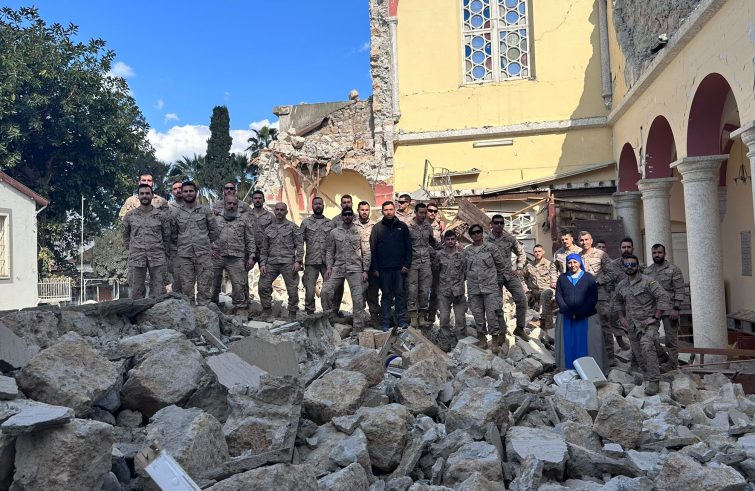 Thanks God the weather in the town of Iskenderun is not very cold. It’s sunny with a mean temperature of seven degrees Celsius. The weather will remain like this throughout the week, according to forecasts, and it be helpful, even though temperatures drop at night making it hard for people living on the streets. In fact, the quake made thousands of houses uninhabitable, they could collapse at any moment. “The tremors continue,” says Father Antuan. “Even last night, I woke up at 2am for a tremor, I couldn’t sleep until 5am. I went back to sleep but there was another very strong tremor immediately after.” Thus life goes on, coordinating aids, assisting people and experiencing tremors that, unfortunately, continue to alarm the population. Father Antuan interrupts his narration and remarks: “Like a captain who does not abandon his ship, we will not abandon these people now. We are staying here, even though we are exhausted. We will not leave. The Lord gives us the strength and the support that we need. Also the Pope is closely accompanying us, he stands by us and makes us feel his presence. His closeness shows us that we are not alone and that we are in communion with the entire Church.”
Thanks God the weather in the town of Iskenderun is not very cold. It’s sunny with a mean temperature of seven degrees Celsius. The weather will remain like this throughout the week, according to forecasts, and it be helpful, even though temperatures drop at night making it hard for people living on the streets. In fact, the quake made thousands of houses uninhabitable, they could collapse at any moment. “The tremors continue,” says Father Antuan. “Even last night, I woke up at 2am for a tremor, I couldn’t sleep until 5am. I went back to sleep but there was another very strong tremor immediately after.” Thus life goes on, coordinating aids, assisting people and experiencing tremors that, unfortunately, continue to alarm the population. Father Antuan interrupts his narration and remarks: “Like a captain who does not abandon his ship, we will not abandon these people now. We are staying here, even though we are exhausted. We will not leave. The Lord gives us the strength and the support that we need. Also the Pope is closely accompanying us, he stands by us and makes us feel his presence. His closeness shows us that we are not alone and that we are in communion with the entire Church.”












